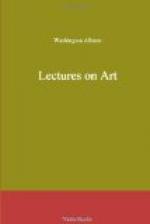That such effects as have just been objected could not be from Beauty alone, in its pure and single form, but rather from its coincidence with some real or supposed moral or intellectual quality, or with the animal appetites, seems to us clear; as, were it otherwise, we might infer the same from a beautiful infant,—the very thought of which is revolting to common sense. In such conjunction, indeed, it cannot but have a certain influence, but so modified as often to become a mere accessory, subordinated to the animal or moral object, and for the attainment of an end not its own; in proof of which, we find it almost uniformly partaking the penalty imposed on its incidental associates, should ever their desires result in illusion,—namely, in the aversion that follows. But the result of Beauty can never be such; when it seems otherwise, the effect, we think, can readily be traced to other causes, as we shall presently endeavour to show.
It cannot be a matter of controversy whether Beauty is limited to the human form; the daily experience of the most ordinary man would answer No: he finds it in the woods, the fields, in plants and animals, nay, in a thousand objects, as he looks upon nature; nor, though indefinitely diversified, does he hesitate to assign to each the same epithet. And why? Because the feelings awakened by all are similar in kind, though varying, doubtless, by many degrees in intenseness. Now suppose he is asked of what personal advantage is all this beauty to him. Verily, he would be puzzled to answer. It gives him pleasure, perhaps great pleasure. And this is all he could say. But why should the effect be different, except in degree, from the beauty of a human being? We have already the answer in this concluding term. For what is a human being but one who unites in himself a physical, intellectual, and moral nature, which cannot in one become even an object of thought without at least some obscure shadowings of its natural allies? How, then, can we separate that which has an exclusive relation to his physical form, without some perception of the moral and intellectual with which it is joined? But how do we know that Beauty is limited to such exclusive relation? This brings us to the great problem; so simple and easy of solution in all other cases, yet so intricate and apparently inexplicable in man. In other things, it would be felt absurd to make it a question, whether referring to form, color, or sound. A single instance will suffice. Let us suppose, then, an unfamiliar object, whose habits, disposition, and so forth, are wholly unknown, for instance, a bird of paradise, to be seen for the first time by twenty persons, and they all instantly call it beautiful;—could there be any doubt that the pleasure it produced in each was of the same kind? or would any one of them ascribe his pleasure to any thing but its form and plumage? Concerning natural objects, and those inferior animals which are not under the influence




